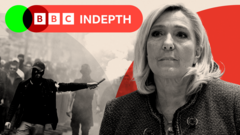Marine Le Pen's recent disqualification from the 2027 presidential election has sent shockwaves through France's political landscape, fostering indignation within the far right while polls reflect a mixed public response. As the future of the National Rally hangs in the balance, political analysts are watching closely for ramifications in the upcoming elections.
Controversial Ban on Marine Le Pen Sparks Outrage and Uncertainty in French Far Right

Controversial Ban on Marine Le Pen Sparks Outrage and Uncertainty in French Far Right
Court's decision to bar Le Pen from the 2027 presidential race ignites passionate responses from the National Rally and opens debates about the future of far-right politics in France.
Marine Le Pen, the leader of France's National Rally (RN), has been thrust into the political spotlight after a court ruling disqualified her from running in the 2027 presidential election. This significant decision has ignited a firestorm of indignation within the far-right faction of French politics, with Le Pen's supporters claiming the justice system is fundamentally flawed. Despite objections from her party, recent polls indicate a restrained public reaction, as the nation grapples with Le Pen's controversial past and the potential impacts on her party's future.
Her supporters have loudly denounced the ruling, characterizing it as an assault on democracy and an attempt to undermine Le Pen, whom many view as a leading contender for the presidential seat. The National Rally has boldly accused the justice system of acting as a "political hit squad," jeopardizing the integrity of France's elections. In a striking comparison, Le Pen likened her situation to that of Russian opposition figure Alexei Navalny, illustrating her perception of being wrongfully targeted.
Political sentiment in France appears divided. According to a pre-verdict opinion poll, Le Pen could potentially capture 37% of the electorate; however, over two-thirds of respondents viewed the court's action as justifiable. The contrast highlights a notable disconnect, as many express approval for her political stance while still affirming the rationale behind the ban.
Prime Minister François Bayrou's admission of concern over the ruling reflects the anxiety permeating the current government coalition, yet some centrists advocate for the importance of upholding judicial independence. As discussions evolve, the pathway toward 2027 remains fraught with uncertainties, marked by the lack of a clear successor to President Emmanuel Macron, who, by law, cannot seek re-election.
Critics have pointed to inherent contradictions in the elites' sympathy for Le Pen, noting their support for anti-corruption measures leading to her disqualification. This framing has prompted some to speculate on Le Pen's own potential agenda behind her recent allegations of a political conspiracy against her.
Looking ahead, the intrigue surrounding the National Rally intensifies. Le Pen's appeal of the ruling could set the stage for a power struggle within the party, with figures like Jordan Bardella emerging as potential successors. Bardella's ability to connect with younger voters raises questions about the long-term viability of Le Pen's leadership as she navigates the fallout from her conviction.
In sum, the court's ruling against Le Pen has sparked outrage and debate within France's far-right coalition as the country braces for what could prove to be a pivotal moment in its political history. The coming months will be crucial, with impending parliamentary moves presenting avenues for the RN to capitalize on perceived victimization, influencing the trajectory of French politics leading into the 2027 election cycle.




















